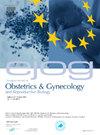异环磷酰胺在妊娠期安全性的综合分析
IF 2.1
4区 医学
Q2 OBSTETRICS & GYNECOLOGY
European journal of obstetrics, gynecology, and reproductive biology
Pub Date : 2025-04-25
DOI:10.1016/j.ejogrb.2025.114003
引用次数: 0
摘要
目的对异环磷酰胺在孕妇中的安全性知之甚少,一些病例报告与羊水过少有关。在这项研究中,我们对有关异环磷酰胺在孕妇中的安全性的现有数据进行了全面分析。材料和方法首先,我们对法国药物警戒数据库中自发报告的怀孕期间使用异环磷酰胺的病例进行了个案审查。其次,我们回顾了文献中的病例。最后,我们对世卫组织全球安全数据库VigiBase (VigiBase)进行了歧化分析,以评估异环磷酰胺与孕妇某些不良事件之间的关系。结果共发现27例妊娠期异环磷酰胺使用病例。无先天性畸形报告。主要不良事件为宫内生长受限(n = 15, 56%)和羊水过少或无羊水(n = 15, 56%)。妊娠导致5例(19%)宫内死胎,均在妊娠21周前接受异环磷酰胺治疗。所有活产(n = 22)均为早产,其中5例(23%)伴有新生儿急性肾功能衰竭。此外,据报告有3例(14%)新生儿在无尿症新生儿出生后第一周内死亡。在VigiBase中,有超过263,145份与妊娠相关的自发安全性报告,我们发现与其他抗肿瘤药物相比,异环磷酰胺的羊水过少、宫内生长受限和新生儿急性肾功能衰竭的报告显著增加。结论本综合分析支持异环磷酰胺可能诱发孕妇胎儿肾毒性。它可导致宫内生长受限、羊水过少和新生儿急性肾衰竭,以及胎儿死亡,特别是在妊娠前半期早期接触。本文章由计算机程序翻译,如有差异,请以英文原文为准。
Safety of ifosfamide during pregnancy: A comprehensive analysis
Objective
Little is known regarding the safety of ifosfamide in pregnant women and some case reports were associated with oligohydramnios. In the study, we performed a comprehensive analysis of the available data regarding the safety of ifosfamide in pregnant women.
Material and methods
First, we performed a case-by-case review of the cases related to ifosfamide use during pregnancy that were spontaneously reported in the French Pharmacovigilance Database. Second, we reviewed cases from the literature. Finally, we performed a disproportionality analysis on VigiBase, the WHO global safety database (VigiBase), to assess the association between ifosfamide and selected adverse events in pregnant women.
Results
A total of 27 cases of ifosfamide use during pregnancy were identified. No congenital malformation was reported. Main adverse events were intrauterine growth restriction (n = 15, 56 %) and oligohydramnios or anhydramnios (n = 15, 56 %). Pregnancy resulted in intrauterine fetal death in 5 (19 %) cases, all being treated with ifosfamide before the 21th week of gestation. All livebirths (n = 22) were preterm, associated with neonatal acute renal failure in 5 (23 %) cases. In addition, 3 (14 %) neonatal deaths were reported within the first week of life in neonates having anuria. In VigiBase, which has over 263,145 spontaneous safety reports related to pregnancy, we found a significant increased reporting of oligohydramnios, intrauterine growth restriction and neonatal acute renal failure with ifosfamide compared to other antineoplastic agents.
Conclusion
Altogether, this comprehensive analysis supports that ifosfamide may induce fetal nephrotoxicity in pregnant women. It can result in intrauterine growth restriction, oligohydramnios and neonatal acute renal failure, as well as fetal death especially for early exposure during the first half of pregnancy.
求助全文
通过发布文献求助,成功后即可免费获取论文全文。
去求助
来源期刊
CiteScore
4.60
自引率
3.80%
发文量
898
审稿时长
8.3 weeks
期刊介绍:
The European Journal of Obstetrics & Gynecology and Reproductive Biology is the leading general clinical journal covering the continent. It publishes peer reviewed original research articles, as well as a wide range of news, book reviews, biographical, historical and educational articles and a lively correspondence section. Fields covered include obstetrics, prenatal diagnosis, maternal-fetal medicine, perinatology, general gynecology, gynecologic oncology, uro-gynecology, reproductive medicine, infertility, reproductive endocrinology, sexual medicine and reproductive ethics. The European Journal of Obstetrics & Gynecology and Reproductive Biology provides a forum for scientific and clinical professional communication in obstetrics and gynecology throughout Europe and the world.

 求助内容:
求助内容: 应助结果提醒方式:
应助结果提醒方式:


